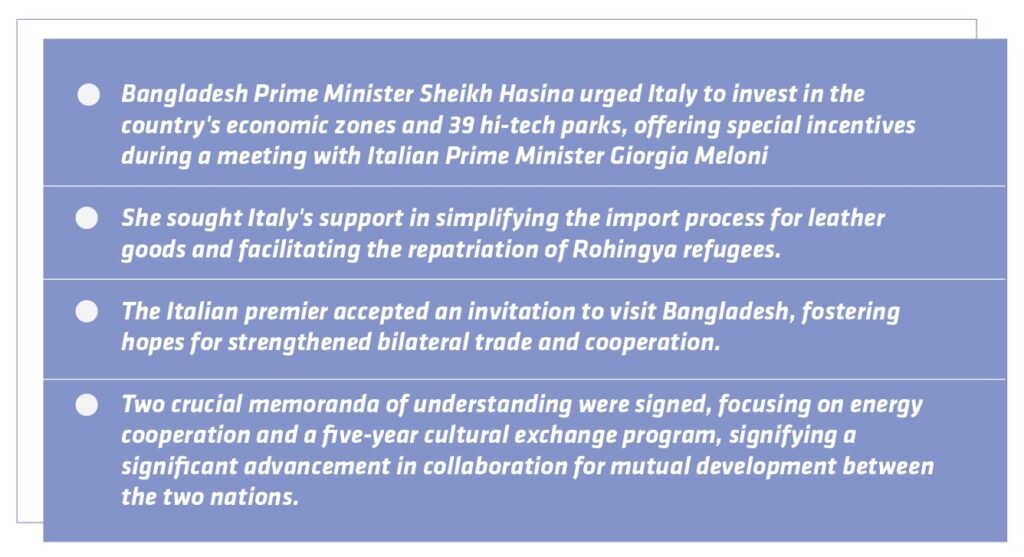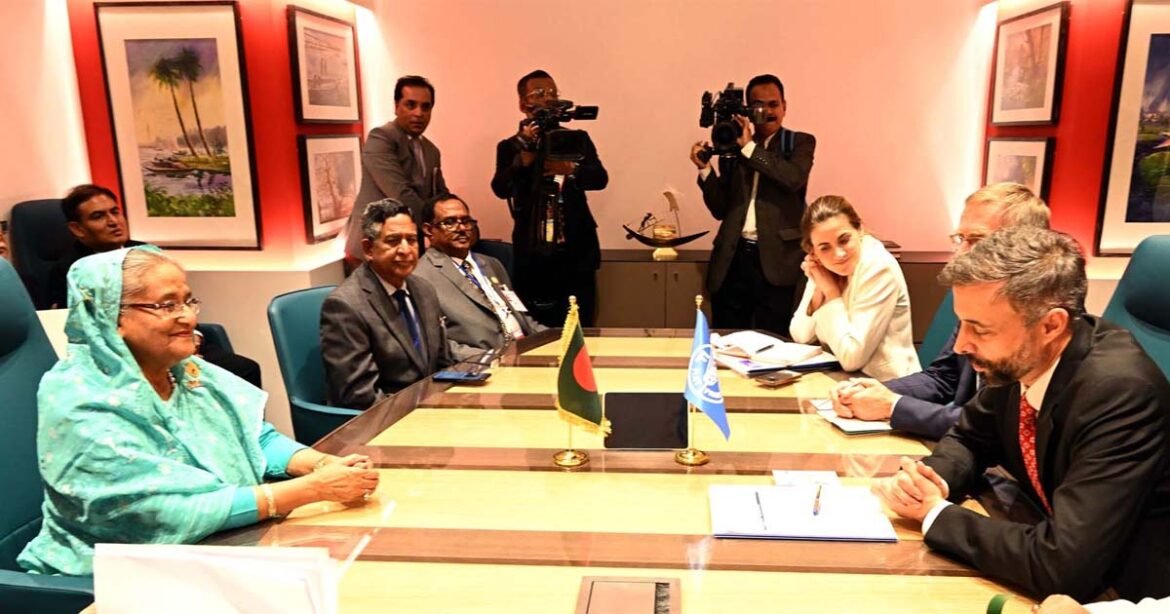The opportunity for Bangladeshi workers to find employment in Italy also affords them the chance to enhance their standard of living, provide for their families back home, and contribute in nation’s GDP
Italy’s recent interest in employing more Bangladeshi laborers, particularly in its agriculture and hospitality sectors, represents a significant transition in the nation’s approach to migration and labor. The move comes as three Italian ministers and Italian premier met with Prime Minister Sheikh Hasina during the ongoing UN Food Systems Summit in Italy. On the sidelines of the summit, the Prime Minister held meetings with Italy’s Agriculture Minister Francesco Lollobrigida, Interior Minister Matteo Piantedosi, and Justice Minister Carlo Nordio.
You can also read: Central Bank Launches Clean-Note Policy for Improved Currency Quality
The cooperation between Bangladesh and Italy goes beyond the exchange of labor force. The two countries held Political Consultations on June 7 of this year, investigating avenues for deepening their relations in trade and investment, technological intervention, defense and security, information and communications technology, and agriculture, among other areas. Italy’s support for Bangladesh’s management of the Rohingya crisis and its desire to collaborate as partners in the Indo-Pacific contribute to the strengthening of bilateral ties.
Italy to hire more Bangladeshi manpower
“Italy wants to hire more workers from Bangladesh for its hospitality and agriculture sectors. They opened the door for Bangladesh to send workforce in legal ways,” foreign minister AK Abdul Momen said while briefing about the meetings held at the Food and Agriculture Organization (FAO) headquarters.
This gesture reflects Italy’s appreciation for the contributions Bangladeshi laborers have made to its economy.
The issue of undocumented workers was also discussed, with the Italian ministers and the prime ministers of Bangladesh and Italy emphasizing the importance of maintaining legal migration channels. Giorgia Meloni, the Italian prime minister, has stated that Bangladeshis should migrate to Italy, but they must do so legally.
“Bangladeshi workers are doing very good work here. They have enough credibility. I don’t want illegal workers,” she said in a bilateral meeting with Sheikh Hasina in Rome on Tuesday, according to state news agency BSS.
Sheikh Hasina emphasized the significance of discouraging illicit migration and urged the Italian government to legalize skilled and well-mannered undocumented workers. She stated that both documented and undocumented Bangladeshis contribute to the prosperity of both nations, but added that Bangladesh discourages illegal immigration.
“I maintain a zero-tolerance policy towards illegal migration,” said the Bangladeshi premier.
Benefits of hiring more Bangladesh manpower in Italy
The economic benefits of Italy’s interest in Bangladeshi labor can be shared with Bangladesh. For Italy, experienced Bangladeshi laborers can cover labor shortages in key industries such as agriculture and hospitality, thereby promoting economic growth and productivity. The opportunity for Bangladeshi workers to find employment in Italy also affords them the chance to enhance their standard of living, provide for their families back home, and contribute in nation’s GDP.
Encouraging legal migration can enhance the safety and well-being of workers. Legal pathways provide protection against exploitation and human trafficking, and they ensure that migrants have access to proper labor rights and social security. For both nations, legal migration can reduce the burden of undocumented workers and improve overall governance.
The exchange of workers can lead to cultural enrichment, fostering understanding and cooperation between the two countries. Bangladeshi workers can share their skills, traditions, and knowledge, while experiencing Italy’s diverse culture and lifestyle.
Moreover, Bangladesh has signed a memorandum of understanding of five-year cultural exchange program with Italy.
Overcoming challenges
While Italy has established legal migration channels for Bangladeshi workers, the current quota of 3,500 visas may not be sufficient to accommodate the hundreds of thousands of workers who are interested. To avoid the hazards of undocumented travel, more opportunities for legal migration must be created.
The Italian government’s decision to issue 69,700 “seasonal” and “non-seasonal” visas for 31 non-EU countries, including Bangladesh, is a positive step toward facilitating legal migration. To avoid the dangers associated with irregular migration, more opportunities must be created due to the high demand for Bangladeshi laborers.
For successful migration, proper integration and reintegration measures are also crucial. Italy can ensure that arriving workers receive the necessary support and resources to integrate into the local society. For Bangladeshi workers returning home, reintegration programs can help them leverage their skills and experiences gained abroad.
The perilous journey through the Mediterranean Sea remains a major concern. The rise in maritime crossings and casualties highlights the need for safe and regulated migration routes. Both countries must collaborate to combat human trafficking and protect vulnerable migrants from exploitation.
By enhancing border control and implementing effective legal frameworks, Italy can discourage irregular migration and protect vulnerable migrants. Bangladesh also plays a critical role in addressing the issue of human trafficking. Raising awareness among potential migrants about the risks and dangers of irregular migration can help them make informed decisions. Additionally, strengthening cooperation with international organizations, like the International Organization for Migration (IOM), can improve the protection and assistance offered to Bangladeshi migrants throughout their journey.
Bangladeshi migrants’ perspectives
For many Bangladeshi migrants, Italy represents a glimmer of hope and the possibility of a better future. While Bangladesh’s economy has been growing steadily, the allure of better opportunities and higher wages abroad entices many to pursue their fortune in hospitality, agriculture, and other industries in Italy. However, their journey is riddled with challenges and risks.
Lured by dreams of prosperity, some migrants embark on perilous boat journeys, leaving behind impoverished families and their homeland. In transit countries such as Libya, they confront exploitation and danger before attempting the perilous Mediterranean crossing to Italy. These perilous journeys have resulted in tragic incidents, causing death and suffering to those in search of a better existence.
Italy’s stated desire to hire more Bangladeshi laborers through legal channels offers a glimmer of optimism. The change could provide a more organized and secure migration route, thereby reducing risks and exploitation. Despite the fact that Italy has implemented legal migration measures, the demand still greatly exceeds the available supply. By prioritizing legal migration and investing in reintegration programs, Italy and Bangladesh can forge a prosperous bilateral partnership.
Highlights:



